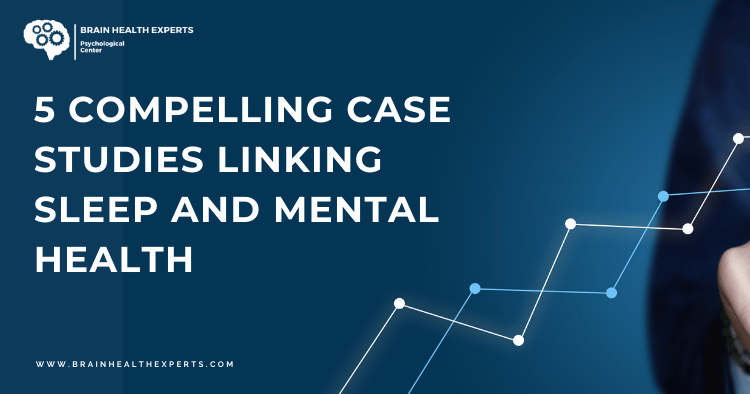Table of Contents
- Introduction
- Case Study 1: The Impact of Sleep Deprivation on Depression
- Case Study 2: Sleep Quality and Anxiety Disorders
- Case Study 3: Insomnia and Bipolar Disorder
- Case Study 4: Sleep Apnea and Post-Traumatic Stress Disorder (PTSD)
- Case Study 5: The Role of Sleep in Cognitive Function and Schizophrenia
- Conclusion
- FAQs
Introduction
Sleep and mental health are intricately connected. While it’s widely known that poor sleep can lead to various mental health issues, recent studies have illuminated the complexities of this relationship. This article explores five compelling case studies that demonstrate how sleep affects mental health conditions such as depression, anxiety, bipolar disorder, PTSD, and schizophrenia. By delving into these real-world examples, we hope to provide a deeper understanding of the importance of good sleep hygiene for mental well-being.
Case Study 1: The Impact of Sleep Deprivation on Depression
A comprehensive study conducted by the American Journal of Psychiatry (2024) followed a group of individuals suffering from moderate to severe depression. Researchers found that those who reported chronic sleep deprivation—defined as less than six hours of sleep per night—exhibited heightened symptoms of depression.
Key Findings:
- Participants with sleep deprivation reported a 70% increase in depressive symptoms.
- Sleep interventions, including cognitive behavioral therapy for insomnia (CBT-I), led to a 50% reduction in depression scores after six weeks.
Prioritizing sleep not only improves mood but could also serve as an adjunct treatment for depression.
For more insights, consider reading about 10 Proven Techniques to Boost Your Self-Esteem Today, as self-esteem can be significantly affected by sleep quality.
Case Study 2: Sleep Quality and Anxiety Disorders
In another compelling study published in the Journal of Anxiety Disorders (2024), researchers examined the effects of sleep quality on individuals diagnosed with generalized anxiety disorder (GAD). The study spanned over a year and included various age groups.
Key Findings:
- Participants with poor sleep quality experienced heightened anxiety levels, reporting an increase of up to 60% in anxiety symptoms.
- Implementing sleep hygiene techniques—like maintaining a regular sleep schedule and reducing screen time before bed—resulted in a significant decrease in anxiety levels.
The importance of good sleep practices in managing anxiety cannot be overstated.
This case study highlights the importance of good sleep practices in managing anxiety. Interested in effective sleep strategies? Explore more in 10 Effective Strategies to Manage Anxiety in Daily Life.
Case Study 3: Insomnia and Bipolar Disorder
The relationship between insomnia and bipolar disorder was explored in a study published in Bipolar Disorders (2024). This research followed individuals diagnosed with bipolar disorder and evaluated their sleep patterns over a two-year period.
Key Findings:
- Participants who experienced insomnia were 80% more likely to have manic episodes.
- Treatments focusing on improving sleep quality, including light therapy and medication adjustments, reduced the frequency of manic episodes by 40%.
Integrating sleep improvement strategies into treatment plans is crucial for those with bipolar disorder.
This case study underscores the critical need for integrated treatment approaches addressing both sleep and mood stabilization in individuals with bipolar disorder. For broader insights on emotional health, see 10 Ways Positive Thinking Boosts Emotional Well-Being.
Case Study 4: Sleep Apnea and Post-Traumatic Stress Disorder (PTSD)
A groundbreaking study featured in the Journal of Clinical Sleep Medicine (2024) examined the correlation between sleep apnea and PTSD in veterans. This research involved over 1,000 participants and provided critical insights into the dual impact of these conditions.
Key Findings:
- Veterans with sleep apnea were 50% more likely to develop PTSD symptoms.
- Treatment of sleep apnea through continuous positive airway pressure (CPAP) therapy led to a 30% reduction in PTSD symptoms over six months.
Addressing sleep disorders is vital, especially in populations at risk for mental health issues.
These findings highlight the importance of diagnosing and treating sleep disorders, particularly in populations at risk for mental health issues. For more on mental health management, explore 10 Effective Stress Management Strategies for Workplace.
Case Study 5: The Role of Sleep in Cognitive Function and Schizophrenia
A study published in Schizophrenia Bulletin (2024) focused on the cognitive impairments associated with schizophrenia and how sleep disturbances exacerbate these issues. Researchers observed patients over a one-year period, assessing sleep quality and cognitive performance.
Key Findings:
- Participants with sleep disturbances showed a 40% decline in cognitive function compared to those with regular sleep patterns.
- Cognitive remediation therapy combined with sleep interventions improved cognitive performance by 25%.
Understanding the link between sleep quality and cognitive health can lead to more effective treatment plans.
This case demonstrates the critical intersection of sleep quality and cognitive health in individuals with schizophrenia, emphasizing the need for holistic treatment plans. For insights into cognitive behavioral therapy, check out 10 Effective Cognitive Behavioral Techniques to Reduce Stress.
Conclusion
The link between sleep and mental health is undeniable. These case studies illustrate how addressing sleep issues can significantly impact mental health outcomes, from reducing symptoms of anxiety and depression to mitigating the effects of serious conditions like bipolar disorder and PTSD. Prioritizing sleep is not just about feeling rested—it’s a vital component of maintaining mental well-being.
FAQs
Q: How many hours of sleep do adults need?
A: Most adults require 7-9 hours of sleep per night for optimal health.
Q: Can improving my sleep help with my anxiety or depression?
A: Yes, studies show that improving sleep quality can lead to significant reductions in symptoms of anxiety and depression.
Q: What are some effective sleep hygiene practices?
A: Effective practices include maintaining a regular sleep schedule, creating a comfortable sleep environment, and limiting screen time before bed.
Q: Should I seek professional help for sleep issues?
A: If sleep disturbances persist despite practicing good sleep hygiene, it may be beneficial to consult a healthcare professional for further evaluation and treatment options.
For more information on mental health and sleep, visit the National Institute of Mental Health and Centers for Disease Control and Prevention.




